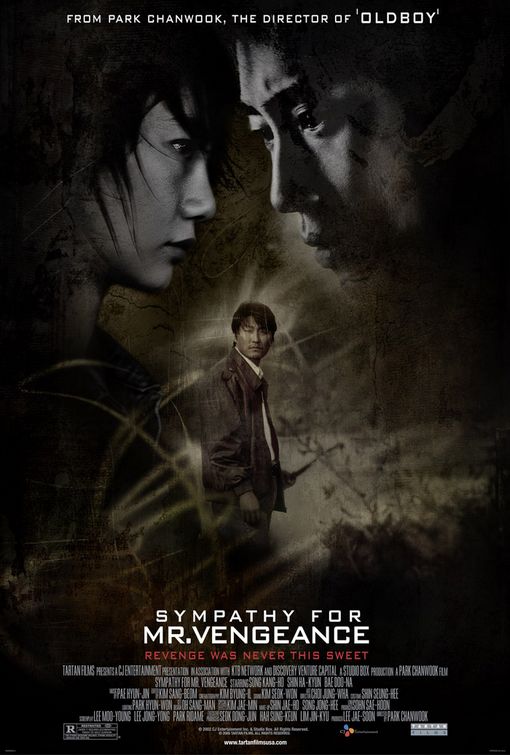“Vengeance Is Mine, Saith the Lord”

| None | Light | Moderate | Heavy | |
|---|---|---|---|---|
| Language | ||||
| Violence | ||||
| Sex | ||||
| Nudity |
What You Need To Know:
The viewer’s sympathy shifts in this movie from Ryu and his sister to Ryu’s rich boss, Park, not to mention his poor daughter. Regrettably, this compelling, well-directed movie squanders all this sympathy by wallowing in an immoral humanist landscape of blood, rage, revenge, despair, and tragedy. Adding insult to injury, violent Communist terrorists brutally overcome the rich capitalist victim. Besides graphic violence, SYMPATHY FOR MR. VENGEANCE also contains strong foul language, nudity and four crude, offensive and gratuitous sex elements. All this is depressing and ultimately abhorrent.
Content:
(HHH, ACapACapACap, CoCo, B, LLL, VVV, SSS, NN, A, DD, MMM) Very strong humanist worldview, with very strong anti-capitalist content and some Communist content, but Communist characters seem to be ridiculed a few times (though not in a vicious way) and movie contains other light moral points that implicitly rebuke revenge, create sympathy for a crime victim and express concern about the rising high cost of healthcare for the lower classes; 13 obscenities, including some “f” words, and man relieves himself at urinal; very strong violence includes images of corpses (including one little girl), two autopsy scenes with scalpel beginning to cut open chests of two corpses, man has stitches from having his kidney taken, blood gushes from neck artery after man stupidly removes the ice pick from wound, people beaten with baseball bat, stabbings, implied suicide and murders, man has deep wounds in back of both ankles, implied accidental drowning, depicted torture with electric volts, electrical power knocks another person unconscious; very strong sexual content includes depicted masturbation by four men, sounds of sex coming from upper apartment, man with pants down appears prepared to indulge in necrophilia, and lengthy depicted fornication scene; upper female nudity during explicit sex scene and in photo while four men masturbate and upper and rear male nudity; alcohol use; smoking and some drug use; and, stealing, brutality, kidnapping, bondage, cheating and betrayal, and lots of revenge that just ends in death, which could be an implicit rebuke of the idea of vengeance, but also seems to mistake justice for vengeance and, hence, contradicts the Bible’s nuanced position on the issue.
More Detail:
As Frank McConnell so wisely noted in his book STORYTELLING AND MYTHMAKING, the Film Noir movie usually takes place in a melodramatic world of corruption, where man (and woman) have corrupted the foundational laws in a society, as well as the rules of chivalry that grow out of those laws. The hero, or protagonist, has to navigate through this corruption, sometimes, as in the adaptations of James Cain’s novels (e.g., THE POSTMAN ALWAYS RINGS TWICE), having already been corrupted himself, or becoming corrupted as the story unfolds. The French word “femme fatale” (literally disastrous woman), originated circa 1912, reaches its epitome in the Film Noir movies. These films are actually an outgrowth of the “hardboiled” crime fiction of writers like Hammett, Cain and (probably the best writer of the whole bunch) Raymond Chandler (THE BIG SLEEP), who re-defined the crime fiction novel when they began writing for BLACK MASK magazine in the mid 1920s and early 1930s.
Since the 1990s, we have seen a huge resurgence of the Film Noir, hardboiled genre with Quentin Tarantino’s PULP FICTION and the adaptation of James Elroy’s hardboiled crime novel L.A. CONFIDENTIAL. Most of the movies that have followed these two movies, however, have forgotten one of the essential rules that Chandler set down for hardboiled crime fiction or Film Noir: that the protagonist must have, at some point, a positive moral character that the reader or viewer can emotionally and intellectually respond to while reading or watching.
SYMPATHY FOR MR. VENGEANCE, a 2002 South Korean film noir that’s just now reaching major markets in the United States, is deliberately patterned after the classic Film Noir, hardboiled movies and novels of the past. The director even refers to Raymond Chandler, but he displays little affinity for the moral requirements of the genre when he says that, in his film “reality,” he considers the world as a “barren desert. . . a dry, cold place that is unfair, obscure, and totally unpredictable.” Thus, just when the movie builds some sympathy for the plight and moral character of the two main characters, it destroys them by wallowing in an immoral humanist landscape of blood, revenge, despair, and rage. Furthermore, in the movie’s last scene, the troubled victim who takes center stage in the middle of the movie is completely overwhelmed by radical, Communist terrorists. Consequently, the director, Park Chan-Wook’s, desolate humanist worldview eventually overwhelms the movie’s attempt to make a strong moral statement against revenge and against the rising high costs of healthcare in the neo-socialist economies of first-world nations like South Korea.
The movie’s beginning focuses on Ryu, a young deaf-and-dumb factory worker who quit art school to earn money for a kidney transplant for his sister. Ryu discovers he is an unsuitable donor, so, after he gets laid off from work, he turns to the black market to trade his kidney for another kidney. The criminals renege on the deal, however, after taking his kidney, so Ryu and his Communist girlfriend decide to kidnap the daughter of Park Dong-Jin, his former rich boss. Tragedy occurs, resulting in the suicide of Ryu’s sick sister and the accidental death of the little girl. Bound by their common sense of loss and rage, Ryu and Park are on a collision course of revenge.
At first, the viewer has great sympathy for Ryu and his sister. Then, however, sympathy shifts to Ryu’s rich boss, Park, not to mention his poor daughter. Regrettably, this compelling, well-directed movie squanders all this sympathy by wallowing in an immoral landscape of blood, rage, revenge, despair, and tragedy. Adding insult to injury, violent Communist terrorists brutally overcome the rich capitalist victim. Besides significant graphic violence, SYMPATHY FOR MR. VENGEANCE also contains strong foul language and four crude, offensive and gratuitous sex elements. All of this is depressing, as well as abhorrent.
As Raymond Chandler himself once said, all great art is redemptive. Though Chandler did not mean this in a strictly biblical or Christian sense, MOVIEGUIDE® agrees with this notion. Thus, the world’s filmmakers would do well to remember Chandler’s legacy, and MOVIEGUIDE®’s Christian admonitions, whether they want to make a Film Noir like Chandler and his artistic companions, or dabble in all the other possible genres available to them.


 - Content:
- Content: 

